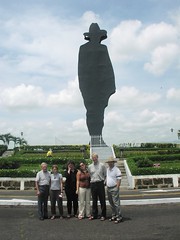Saturday, December 31, 2005
Good night
and to all my friends, old and new.
May we wake in the morning to find
a more peaceful and just world
and the strength to make it so.
Dan
Tuesday, December 27, 2005
Clarence Jordan, Part I
I quoted from Clarence Jordan's Cotton Patch Gospel in a previous post and folk asked about Clarence [last name pronounced, "jer' dan"]. Clarence and his wife, Florence, have a most interesting and uplifting story (with some small connections to our humble little church here in Louisville) and he is considered a saint by those of us so inclined. I've borrowed bits of a story by Joyce Hollyday to fill you in.
Enjoy and be inspired.
From an excellent story in:
© Sojourners, December 1979, Vol 8, no 12
by Joyce Hollyday
Florence and Clarence Jordan met at Southern Baptist Seminary in 1933, where he was a student and she the assistant librarian. When they began to consider marriage, Clarence said to her, "If you want to be the wife of a pastor of a First Baptist Church, you don't want to marry me." And he shared with her his plans to go back to the deep South, which was his home, to use his undergraduate agricultural training and "do something for the poor."
Clarence and Martin England, a former American Baptist missionary, found 440 acres of land in Sumter County, near Americus Georgia. Beginning to formulate a vision for a Christian farming community that could be a resource for the rural poor, Clarence and the England family moved there in the fall of 1942. The Jordans' first son was born in September, so Florence stayed with her parents in Louisville and then with Clarence's parents until April, 1943, when the house that Clarence and Martin were building was, in Florence's words, "at least campable."
Florence remembers that the switch from big-city living to "days of cooking on a wood stove, washing in the old iron pot, and carrying water were not easy. The land was a rather desolate-looking place, with some sagging barns, outbuildings, and sheds, one large, unpainted house , and two rundown tenant houses. But we were young and it was an adventure wit the Lord."
They called this adventure Koinonia, from the Greek word which was used to identify the early church in Acts, which pooled its resources and shared the life of Jesus Christ in an atmosphere of reconciliation. This was the model for the fledgling farm. The particular reconciliation that was so desperately needed at this time and place was between black and white. The Koinonians hired a black man, a former sharecropper, to help with the farm. They all ate their meals together, and this breach of Southern tradition brought on the first hostility toward the community.
In a story that has been told many times, Clarence showed the courage and quick wit that became his trademark. A group of men came to the farm. Their spokesman said to Clarence, "We're from the Ku Klux Klan and we don't allow the sun to set on people who eat with niggers."
Clarence glanced over at the western sky and noticed that the sun was creeping low. He thought a bit, swallowed a few times, and suddenly reached out, grabbed the man's hand, and started pumping away, saying , "Why, I just graduated from Southern Baptist Seminary, and they told us there about folks who had power over the sun, but I never hoped to meet one here in Sumter County." They all laughed, and nobody noticed that the sun had slipped down below the horizon.
Despite the hostility of white neighbors, the farm soon became a success. Clarence invented a mobile peanut harvester and established a "cow library," through which poor neighbors could check out a cow for a period of time so that they could have milk. He built a deluxe chicken house that was the envy of the Koinonia wives, whose own houses were austere by comparison. The luxurious chicken quarters were the target of many jokes from the neighbors, but when Clarence began getting more eggs than anybody else, those same neighbors were soon asking him for advice.
Meanwhile, Clarence's reputation as a powerful, uncompromising preacher was growing. As he traveled the country preaching pacifism, social justice, and community, he drew young people to the experiment at Koinonia.
Florence remembers that people who came to visit the farm were always surprised to meet Clarence. They always expected to see an "older, intellectual-type person," rather than this large man who had earned his doctorate when he was 26 years old.
A distinguished professor once came to the farm while Clarence was working on a tractor. The man said, "I wish to speak to Dr. Jordan." Clarence wiped off a greasy hand, extended it, and said, "I am he." The man responded, "No, I wish to speak to Dr. Clarence Jordan." Clarence insisted that he was the one the man was looking for. After repeating his request, the professor finally got in his car and left. A few days later Clarence received a letter from the man, expressing that he was infuriated with the impudent help that Dr. Jordan managed to keep around.
Florence believes that Clarence "was one of those rare persons in whom dreams and practicality came together. He could do everything. He was not only a good farmer, he was a mechanic and an intellectual; he could lay bricks and do electrical work, whatever needed to be done. And he was as good in the kitchen and with the children as I was."
Some of the people who came to visit on the farm stayed. By 1950 the community included 14 adults. They embarked on year of struggle, marked by tension, mixed expectations, and disillusionment. Things moved slowly, every decision was labored, and community living was difficult. The infant community was beginning its arduous growth into tumultuous youth.
Clarence Jordan, Part II
In August, the small Rehoboth Baptist Church, where Florence had taught Sunday school and Clarence had led the singing and preached occasionally in the previous eight years, made a move to withdraw fellowship from the Koinonian's because of their racial view.
Florence faced the congregation alone while the others were out of town. She sat quietly in the pew as the recommendation to reject them was read. There was a tense pause. Then Florence got to her feet and moved that the recommendation be accepted as read. The congregation responded with stunned silence, supporting the motion, but unwilling to side with Florence. The Koinonians were eventually excommunicated, but Florence had shown the rare courage that was part of Koinonia from the beginning...
Clarence's aid to two black students in their application to a formerly segregated college in Atlanta was the spark that ignited the hostility. It began with threatening phone calls, grew to vandalism, and finally escalated into life-threatening violence.
Fences were cut, crops stolen from the fields, and garbage dumped on the property. A truck's engine was ruined by sugar placed in its gas tank, and nearly 300 fruit trees were chopped to the ground.
The children faced hostility and abuse in school, and the Jordan family was finally forced to send 14-year old Jim Jordan away to private school.
The farm's roadside market was bombed several times and eventually destroyed. Nightriders sprayed machine-gun bullets at the houses. Fires were set on the property, and crosses were burned on the lawns of black friends.
Several members of the community were called before a grand jury in the spring of 1957, the outcome of which was a report accusing Koinonia of maintaining Communist ties and of self-inflicting the violence for attention and profit. The community was asked to leave the county.
The violence forced the community members to ask difficult questions...
"Sometimes there was shooting two and three times a week, and we knew there was a chance that somebody might be killed...But we said, 'Well, that's okay too. We're not the first Christians who will have died for what we believe, and we won't be the last.'"
"The strange thing was that once we had made that decision, that it really didn't matter whether we lived or died because as Christians we're bought with a price, we're not our own, there was a peace. I think that is what Jesus meant when he said, 'I give you the peace that passes understanding.' It's the kind of thing that all Christians ought to face. But I'm glad they don't have to. But it did do something for us, and so we survived. And no one was seriously injured."
Sumter County residents bolstered their attack with the weapon of economics, hoping to choke the farm's livelihood, since they seemed unable to scare the Koinonians away.
"They formed a real solid boycott. One businessman told us that he was forced to sign at the point of a gun not to sell to us. We couldn't buy gas, fertilizer, or feed. We couldn't sell an egg. For about a year there we didn't make a living. If it had not been for our friends, who voluntarily gave to us, we couldn't have done it."
It was necessity that forced the community into the mail-order pecan business during the boycott. The mail and the open pecan market were two things the local people could not control...
Clarence's plan was a way for the rich to share their resources and for the poor to find new hope and security in their lives. His idea was that the farmers would work together as partners, providing for one another and returning any excess back to the fund so that more land could be purchased for others.
The idea of partnership was carried out in the farming, the pecan industry, and in housing. With Clarence and Millard [Fuller, founder of Habitat for Humanity, which sprung from Koinonia. -dan] working together on the fund raising, money poured in from friends and churches. By this time the farm covered 1,400 acres. Plots of land were sold to area residents at whatever price they could pay. By 1969, the first house had been built. Koinonia Partners was in business.
Clarence lived to see the first house almost completed. On October 29, 1969, at the age of 57, he died.
Millard was unable to convince the coroner or county medical examiner to come to the farm to pronounce Clarence dead: "Even in death, Clarence Jordan was rejected by the high and mighty, by those in authority, in the area in which he lived. But this was not surprising to me, as it never had been to him, because the Bible promises that a prophet is never with honor in his home area."
The medical examiner insisted that Millard rent an ambulance and bring Clarence's body to the hospital. But Millard felt that Clarence would have objected strongly to having money spent on a dead body. "So we loaded the body in the car...I smiled as I went through town with Clarence sitting down. I knew he would have gotten a terrific charge out of that."
======
I could go on and on, he's such an interesting character and Koinonia's story is so fascinating, but that's enought to whet your appetite. Feel free to read his own writings, or more about his story. For more info about Koinonia Farms and the Jordan's, visit:
Friday, December 23, 2005
Merry Christmas, Happy Holy Days!
"You’ve also heard the saying, ‘Take an eye for an eye; take a tooth for a tooth.’ But I’m telling you, never respond with evil. Instead, if somebody slaps you on your right cheek, offer him the other one too. And if anybody wants to drag you into court and take away your shirt, let him have your undershirt. If somebody makes you go a mile for him, go two miles. Give to him who asks of you, and don’t turn your back on anyone who wants a loan.
"Another thing you’ve always heard is, ‘Love your own group and hate the hostile outsider,’ But I’m telling you, love the outsiders and pray for those who try to do you in, so that you might be sons of your spiritual Father...
"Therefore, let me tell you all something: Don’t worry about making a living—what you’ll eat, what you’ll drink, what you’ll wear. Isn’t the life of a man more important than what he eats? Think for a moment about the birds of the sky. They don’t plant. They don’t harvest. They don’t store up in barns. Even so, your spiritual Father cares for them. Really now, aren’t you all more precious than birds? Besides, who of you, by fretting and fuming, can make himself one inch taller?
"And what’s all this big to-do over clothing? Look yonder at that field of flowers, how they’re growing. They do no housework and no sewing. But I’m telling you, not even Solomon in all his finery was ever dressed up like one of them. Well then, if God so clothes the flowers of the field, which are blooming today and are used for kindling tomorrow, won’t he do even more for you, you spiritual runts?... Don’t worry over the future; let the future worry over itself. Each day has enough trouble of its own...
"Keep your eye peeled for fake preachers, who come to you with sheepskins from wolf-schools. You’ll be able to distinguish them by the way they live. You know, you don’t gather pecans from a persimmon tree nor peaches from a chinaberry, do you?... Any tree that does not produce cultivated fruit is chopped down and thrown into the fire. That’s why I told you that you could know them by the way they live.
"Not everyone who glibly calls me ‘Lord, Lord,’ shall enter the God Movement, but he who does the will of my spiritual [Mother]. The time will come when many people will gather around and say, ‘L-o-ord, oh L-o-o-rd, we sure did preach in your name, didn’t we? And in your name we gave the devil a run for his money, didn’t we? We did all kinds of stunts in your name, didn’t we?’ Then I’ll admit right in front of everybody, ‘I’ve never known you. Get away from me, you wicked religious racketeers!'"
When Jesus finished speaking, the people were simply amazed at his ideas, for he was teaching them like he knew what he was talking about. He didn’t sound like their preachers.
======
Happy Birthday, Jesus. Thanks for the Great Gift.
Wednesday, December 21, 2005
Literary Gifts
To that end, young Brandon over at A Book of Voices has started a new blog for book talkin':
Lit Nerd Central
http://litnerdcentral.blogspot.com/
Check it out, it's just starting, but I'm sure it will grow and be a great place at which to waste even more of your precious time.
Monday, December 19, 2005
Okay, okay
A. Seven things to do before I die
B. Seven things I cannot do
C. Seven things that attract me to (...)
D. Seven things I say most often
E. Seven books (or series) that I love
F. Seven movies I watch over and over again (or would if I had time)
G. Seven people I want to join in, too.
A. Before I die...
1. Do a complete one of these list things...
2. Hike the Appalachian Trail
3. Hike Muir's Journey to the Gulf
4. Canoe across Kentucky (downstream, mostly)
B. Can't do...
1. Do a complete one of these list things...
C. That attract me...
D. Say most often...
1. I don't do these list things unless they're short and intrigue me...
E. Books
[On THIS one, I'll bite...but 7 is really unfair:]
1. Wendell Berry essays
2. Wendell Berry fiction (it's a toss up on which is my favorite, don't ask. Just read.)
3. Those who came before Berry (or his contemporaries)
a. Thoreau
b. Gene Logsdon
c. Aldo Leopold
d. Harlan Hubbard (author of "A Payne Hollow Journal")
e. Edward Abbey
f. Barbara Kingsolver
g. David Orr
4. Mary Shelley's Frankenstein
5. The Bible
6. Mark Twain, Mark Twain, Mark Twain!
7. Art Gish ("Living in Christian Community," "Beyond the Rat Race")
8. (sorry) Tolkien
F. Movies...
1. The Mission
2. A River Runs Through It
3. Monty Python and the Holy Grail
4. Marx Brothers
5. Dead Poets Society
6. Harvey
7. True Grit (sorry, I just love this rascally ol' John Wayne flick. Go figure!)
G. Who I'll invite?
Anyone who'd like to answer any or all of these questions, feel free to.
Thanks, Koby
Monday, December 12, 2005
US Poverty...
Myth 1. Welfare increases poverty.
Before our modern welfare state, the US suffered a great deal under the ill-effects of what I would call poverty. A history of welfare in America is also its history of poverty: the more, the less. Rather than repeat what has been written elsewhere, I'll refer you to a link on this topic.
http://www.huppi.com/kangaroo/L-welfarepoverty.htm
Myth 2. Social workers, mental health advocates and other helper agencies are wimpy enablers.
In fact, the role of social workers is to enable people to be as self-sufficient as they possibly can be. In order to do this, they help set strict parameters for getting out of negative habits. Doesn't always work and, sure, there may be some "helpers"out there that end up enabling, but that only points to the need to improve a difficult job rather than end it.
Myth 3. It is wrong to take money from innocent wage-earners to fund what some think is a biblical imperative. [Okay, not actually a myth, but a mistaken notion.]
Taxation, in our context, is exactly the process of taking money from innocent wage-earners to fund what a majority of representatives deem responsible (or, more cynically, what a majority of representatives have been TOLD to vote for by their corporate masters). Those on the left and probably most on the right agree that taxes shouldn't be used to fund what some think is a biblical imperative. In fact, it is usually those on the right who tend to try to do this. To suggest that I'm suggesting this is a misrepresentation of my position.
[And when it comes to taking money from wage-earners, I would like to point out that there is a MUCH greater amount of money taken from innocent us to fund the military than assistance programs. So, it is not the notion of spending money that Conservatives have a problem with - they do that more than anyone, with the assistance of the Democrats usually.]
But back to the topic: Those on the left tend to believe that, while an individual or group may have a biblical foundation for what they believe, that we should only push as government policy what we can make a logical argument for (not a biblical one).
So, while I have a biblical foundation for what I believe about assistance for the poor, for instance, that is not part of my civic reasoning for policy-making. Instead, in the case of poverty (or, assisting those struggling in the US, if you don't like the term "poverty"), I would argue that it is fiscally responsible (a conservative notion?) to invest in good education, assisting people out of poverty, keeping families together where reasonably possible (at a cost of $x) instead of paying down the road to house prisoners, to deal with the ill-effects of poverty, to deal with drug abuse, to decrease abortion (at a cost of $2x).
I'll own up that I don't know the numbers off the top of my head. The above-linked article delves in to this topic somewhat. If it is debatable to you whether it is cheaper to deal with poverty later rather than earlier, then we can get to the specifics of What costs How Much...
Repond, s'il vous plait.
Sunday, December 11, 2005
Snowy Lampposts

Snowy Lampposts
Originally uploaded by paynehollow.
Does anyone know how to take good snowy day pictures? This was a beautiful, misty whiteout sort of snow and I took several shots in various settings but couldn't get a decent one.
Friday, December 9, 2005
The Bible, Wealth and Poverty, Part I
Are you familiar with the story of Josiah, the boy king? Found in 2 Kings, maybe elsewhere.
In his story, he goes about trying to setting the temple back a-right, after years of neglect. In the process, he finds the Lost Book of the Law - their scriptures. After reading it and realizing how far away Israel had wandered from God's teachings, young Josiah tore his clothes in despair.
I feel that way sometimes. That our scriptures have been Lost. Only this time, they weren't lost, hidden away in some secret cabinet in a neglected temple. They were lost by means of obfuscation.
Our churches have for years obcured and twisted the scriptures in to something that only bears a passing resemblance to the words therein. Hidden in plain sight.
I grew up in a Baptist church - people of the Bible, they call themselves. And rightly so. The Baptists really push personal study of the Bible, which is a grand thing and for which I'm grateful. But they also so thoroughly taught me what the Bible says, that it has been difficult for me to get beyond those teachings to what the Bible actually says.
I don't think it has always been deliberate or mean-spirited. Our teachings have been passed down this way probably much the way of that old party game where you get in a line and whisper something in the first person's ear and everyone passes it down and the message at the end is often amusingly distorted.
So it has been with some surprise to me that as I try to read the Bible with fresh eyes and an open heart, that I'm discovering the bible is chock full of economic issues.
Remember Mary's song she sang when she was expecting Jesus? Do you remember the line: "The Lord has brought down rulers from their thrones but has lifted up the humble. God has filled the hungry with good things but has sent the rich away empty." Interesting...
We all remember wild-eyed John the Baptist, dressed in his camelskin and eating bugs and calling for repentance. But do we recall WHY he called for repentance? Here's what John said:
"You brood of vipers! Who warned you to flee from the coming wrath? Produce fruit in keeping with repentance...
"What should we do then?" the crowd asked.
John answered, "The man with two tunics should share with him who has none, and the one who has food should do the same."
For John the Baptist, repentance was directly tied to economic justice. Solidarity with the poor.
When John asked Jesus who he was, remember Jesus' answer? "Tell John about the outcasts being healed and that I'm preaching good news to the poor." To the poor specifically!
Or how about when Jesus told the rich young man what he needed to do to be saved, remember? Was it to pray to God for forgiveness and "dedicate his life to Jesus"? No. Jesus told him to sell all he had and join in with his community. Sadly, the rich man left because, Jesus tells us, it is difficult for the rich to enter the kingdom of heaven!
And Jesus, when he began his ministry told us specifically what he was about, by saying:
God has sent me to bring good news to the poor, to proclaim liberty to captives, and to the blind new sight, to set the downtrodden free, to proclaim the Lord's year of favor.
Good news to the poor – specifically to the poor. Healthcare for the sick. Liberty to captives (and looking into this, one big reason folk were jailed was for economic reasons - "the man who could not pay his bills and was about to be thrown into jail," remember?). And Jesus came to proclaim the "Lord's Year of Favor," a reference, I'm told, to the Jubilee Laws of the Old Testament.
The Bible, Wealth and Poverty, Part Deux
So let's jump back to the OT for a minute: What are the Jubilee Laws?
The Jubilee Laws are found in Leviticus initially. They were a means of transferring land back to original owners every 50 years, of freeing indentured slaves every seven years, and of providing food for the poor, among other things. It was also a way of reminding the Israelis that, according to God, “The land must not be sold permanently, because the land is Mine and you are but aliens and My tenants.”
The Jubilee Laws were a way of keeping wealth and power from accumulating in the hands of a few and ensuring “enough” for everyone.
While it is not always obvious, once you know to look for it, you can see references to Jubilee sprinkled liberally throughout the Bible. As are words giving voice to God's concern for economic justice in general. As are God's words of warning and condemnation towards the rich.
Woe unto them that join house to house, that lay field to field, till there be no place, that they may be placed alone in the midst of the earth!
Isaiah 5
Is not this the kind of fasting I have chosen: to loose the chains of injustice and untie the cords of the yoke, to set the oppressed free and break every yoke? Is it not to share your food with the hungry and to provide the poor wanderer with shelter – when you see the naked, to clothe him, and not to turn away from your own flesh and blood?
Isaiah 58
As a cage is full of birds, so are their houses full of deceit: therefore they are become great and waxen rich....they overpass the deeds of the wicked: they judge not the cause, the cause of the fatherless, yet they prosper; and the right of the needy do they not judge. Shall I not visit for these things? saith the Lord: shall not my soul be avenged on such a nation as this?
Jeremiah 5
He that oppresses the poor reproaches his Maker.
Proverbs 14
For three transgressions of Israel and for four, I will not revoke the punishment; because they sell the righteous for silver, and the needy for a pair of sandals – They who trample the head of the poor into the dust of earth, and push the afflicted out of the way.
Amos 2
Now listen, you rich people, weep and wail because of the misery that is coming upon you. Your wealth has rotted, and moths have eaten your clothes. Your gold and silver are corroded. Their corrosion will testify against you and eat your flesh like fire. You have hoarded wealth in the last days.
James 5
Oh! And the “Sin of Sodom?” Well, we all know what that was, don't we? God spells it out for us in Ezekiel 16:
Now this was the sin of your sister Sodom: She and her daughters were arrogant, overfed and unconcerned; they did not help the poor and needy.
I could go on and on with biblical references, but I'll stop here. You get the drift. I'm telling you, it is quite surprising (at least for some of us brought up in churches where we learned the “Big Sins” were drinking, smoking, sex and cussing), to discover how omnipresent God's teachings on wealth and poverty are within the Bible. Front to back.
It is for this reason that I speak about economic issues so frequently in these sorts of conversations. I think the church has it largely wrong. We're focusing on minor issues and are often on the wrong side of God's teachings in the Bible.
Like Young Josiah, I'd like to see the Book of the Law to be rediscovered and reclaimed for what it actually says.
Thoughts?
Thursday, December 1, 2005
Wednesday, November 30, 2005
Poverty Debate
So, let's try opening up a general question specifically for the purpose of debate and see what happens.
Being against poverty is neither a Conservative or Liberal thing. No one is in favor of poverty or its ill effects. And since we discuss spiritual and moral values often, I think we can all agree that the world's religions as well as humanism would all demand some concern for the poor.
Unfortunately, we often disagree on exactly how to do so. So tell me, what do you think the problems facing the poor are, should we be doing anything about it and, if so, what exactly should we do to best help the needy? Does government have a role? Why or why not?
Monday, November 28, 2005
Reclaiming Christmas
The government rose up against its own people, plotted against them, kidnapped and killed them. The powers-that-be, with the force of the military to support their wicked plans, instituted a years-long policy of genocide and systematically killed off those they feared constituted a threat to the government's power.
Sadly, this is not the plot to the latest Hollywood Armageddon movie.
This is exactly what happened from 1960 until 1996 as Guatemala waged war on her own people. In separate reports issued since the end of the war, the U.N. and the Catholic church have well-documented the atrocities committed by the Guatemalan government over the course of the 36-year armed conflict.
I bring this up because it seems appropriate as Christmas nears. It is, after all, not the first time a government waged war against its own citizens for fear of loss of power.
We are all aware of Luke's version of the Christmas story, with the visiting shepherds and angels singing glories to the baby Jesus. Let's not forget, however, Matthew's telling of the same story, in which governmental authorities plot to kill Jesus with the end result being the wholesale slaughter of male children under the age of two in the vicinity of Bethlehem.
Matthew recalls those days, saying there was a voice "heard in Ramah, weeping and great mourning. Rachel weeping for her children and refusing to be comforted, because they are no more."
I'm told that this is the Nativity story that is preferred in Guatemala, for they are a people who identify with the loss of their children and loved ones. These are a people who have known sorrow.
Although Guatemala is our neighbor to the south, I don't believe most of us in the U.S. are very aware of its recent history. What has the killing been about and who is being killed? Most of us, if we know about it at all, probably believe it to have been a civil war having little to do with us.
Here are some facts from the Catholic church's Recovery of Civil Memory report (REMHI) and the U.N.'s Historical Clarification Commission (CEH):
*83% of the victims of violence were indigenous
*90% of human rights violations occurred in rural areas
*According to the CEH, 93% of the atrocities were credited to the governmental forces, with only 3% being committed by the anti-government guerrillas
*200,000 people were killed or "disappeared"
*The Guatemalan army committed over 600 massacres
This was not a civil war. This was a war by the government on the poor and indigenous people of Guatemala.
It gets worse. As it turns out, the war is not over. While the fighting has mostly stopped and the military violence has been curtailed (thanks partially to the peace accord signed in 1996), economic violence has taken its place.
Instead of keeping the poor masses in their place with bullets, the people are threatened with starvation and being kept from a living wage (half of Guatemala's rural population lives on less than $1 a day!)
But why? Why would a government attack its own people? For those who hate to hear anyone disparage this great nation of ours, I've some bad news, folk.
According to the U.N. CEH report, the U.S. government supported Guatemala in its 36-year war on its people. Our tax dollars went to economic and military aid for the government of Guatemala. We did so to protect our economic interests.
And now that the peace accords have been signed, our government is supporting the Guatemalan government in "economic restructuring" that will benefit multinational corporations and the rich minority in Guatemala at the expense of the poor and indigenous who were the targets of the military violence that has just so recently ended.
This is why our country and Guatemala has waged these wars: To protect the economic interests of companies such as Basic Petroleum (a U.S. oil company) and Del Monte, the banana people.
This is why you and I are implicated in the deaths of 200,000 Guatemalans.
And this is why Jesus was born: to forgive you and me and to show us how to repent and work for justice for the oppressed.
And this is why Jesus, like so many innocent Guatemalans, was killed.
As we approach Christmas this year, let us make up our minds to join with Jesus in working to bring God's kingdom on earth. It's not too late to change sides.
=====
On a related note, you might be interested to visit my church's blog, Life at Jeff St. which has information about our Reclaiming Christmas Project on board right now.
Thursday, November 17, 2005
Truth. Or Something Damn Near Like It
WASHINGTON (Reuters) - Democrats asked the U.S. attorney general Wednesday to investigate whether top executives from big oil companies lied to Congress when they said their companies did not take part in Vice President Dick Cheney's energy task force.
At a Senate hearing last week on record oil profits, Democratic Sen. Frank Lautenberg of New Jersey asked five executives, "Did your company or any representatives in your companies participate in Vice President Cheney's energy force in 2001?"
Each executive answered the question in the negative.
However, The Washington Post reported Wednesday that a White House document showed some companies did in fact meet with the task force.
======
Huh! Imagine that! Bush and his cronies lying. Or, as they might call it, telling “their truth,” which is whatever words are most expedient to get what they want. It's Truth to them if they want it to be truth. Faith-based truth.
Or to quote Their Jesus: “You shall know the Truth and the Truth shall make us rich.”
'Tis necessary for us to receive their truth. They can't give us the real truth because we just can't handle the truth. Requires lifestyle changes and who wants to do that?
Meanwhile, let's all bend over and say, “Thank you sir, can you give us another truth?”
======
Nothing in all the world is more dangerous than sincere ignorance and conscientious stupidity.
Martin Luther King Jr.
There are two ways to be fooled: One is to believe what isn't so; the other is to refuse to believe what is so.
Soren Kierkegaard
Wednesday, November 16, 2005
What's Your Time Worth?
While I disagree with him any time we get started on the notion of non-violent resistance (and probably a few other topics), I'd like to suggest you check out Eleutheros' blog (How Many Miles From Babylon), where he recently wrote a three-part series titled, What's Your Time Worth? that are very thought-provoking and well worth your time.
A quote or two:
You see, to make you a good dweller of Babylon it is necessary to segment your attention into artificial time slots and subject that attention to the direction of others. 'Tain't natural! So we must needs begin when you are very young conditioning you to not view your times as a whole, as a gestalt, but rather as unrelated segments. This is done by sending you to school where reality is artificially divided into subjects and you are directed to concentrate on this and only this until we give you the signal then you must concetrate on that other thing and only that other thing. Very useful in making us thralls of Babylon, but it leaves us with the eerie and uncomfortable feeling that our life is awfully short. Where does the time go? There just aren't enough unrelated and disconnected segments in a day!...
But wait a moment, do you actually make $15 an hour? It is the sort of wine-induced stupor that leads the Babylonian to ignore the corporate lie that what you make an hour is the gross amount on your paycheck divided by the time you were on the clock at work. The cold reality is closer to his: add to that the time it takes you to get ready for work in the morning, the commute time both ways, and the time it takes you to wind down in the evening. You thought it was an eight hour day? It's closer to twelve. That $10/hr that's left from taxes is more like $7 for each actual hour spent pursuing it. Now take out an allowance for gas and extra vehicle maintenance, work clothes, meals out, more expensive food at home because you are too tired and occupied to cook from scratch, time spent sick or in a useless boggle from work stress, and you have scarcely $4 spending power for each actual hour spent pursuing that wage.
Deep thoughts, by Ellie.
Check it out:
http://milesfrombabylon.blogspot.com/
[The series begins on November 11.]
Monday, November 14, 2005
When Left Meets Right
One of the pleasures of blogging is the interesting mix of people with which one meets and interacts. I’ve only been doing this for about a year now and already I’ve had more than one occasion to think how cool it’d be to get together with some of the folk music people to have a stringed instrument jam, or with some of my nature friends and go canoeing (often some of the same crowd).
You get the sense that, if some of us lived closer, we’d be friends in the real world as well as in the blogosphere and I’ve honestly thought about working in a vacation to New York, Missouri, Kansas, Minnesota or Vermont (and othe places) and working in visits to new friends and e-lations.
What I didn’t really see coming was that my first encounter with a blogfriend (beyond the folk I already know in the real world) would be with one of our Rightwing-ish friends.
But it has happened. I met and had lunch Friday with Kevin from Loin Girders who was in Louisville all the way from Colorado for a few days to visit his family here. And he went out of his way to be sure to arrange a face-to-face meeting to allow us to get to know one another better.
Turns out he’s a nice guy. Go figure!
Naw, just kidding. I already knew Kevin to be a nice (if most-often wrong) guy. In fact, Kevin was one of the folk that pushed me in to blogging in the first place. He had read an anti-war article of mine that appeared in a local paper and wrote me an email, which led to further emails in which much debate happened, usually civilly. If I remember correctly, he was the one who pointed me to Blogger.
Our meeting and talking in person did not lead to any changes of opinions. No one expected it to and that was not the point. The purpose of our meeting was for the pure joy of conversation and dialog, even if we can’t agree on much except…well, I can’t think of a good example, but I’m sure there’s something.
Thanks for stopping by for a while, Kevin. In the midst of all your family visiting on your very short visit, thanks for taking time to talk with me.
And, even more, thanks for extending the hand of friendship.
Wednesday, November 9, 2005
Some Things Really ARE Black and White
The News:
President Bush on Monday defended U.S. interrogation practices and called the treatment of terrorism suspects lawful. "We do not torture," Bush declared in response to reports of secret CIA prisons overseas.
[So he says, BUT...]
Bush supported an effort spearheaded by Vice President Dick Cheney to block or modify a proposed Senate-passed ban on torture.
"We're working with Congress to make sure that as we go forward, we make it possible, more possible, to do our job," Bush said. "There's an enemy that lurks and plots and plans and wants to hurt America again. And so, you bet we will aggressively pursue them. But we will do so under the law."
[Meaning "Don't change the laws to interpret what we're gonna do to them as torture"?]
=====
The Rest of the Story:
This story has gone WAY under-reported. If Congress passes this law and Bush follows through on his pledge to veto a ban on torture, maybe then we'll see more on the topic.
But what I really want to know is: Where is the outrage? Where is the righteous indignation? What Bush and Cheney are doing is WRONG!!
And yet, in the rightmost hemisphere of the blogosphere, this story has not been mentioned at all or – even worse! – torture has been endorsed!
Please tell me that we can ALL agree with Republican Senator John McCain that torture is simply wrong, that we are better than that and, further, wise enough to know that torture will only undermine our work for justice, making things worse?
Brothers and sisters, can I get an Amen?! (And I'm especially calling out to my Right-thinking friends out there).
Friday, November 4, 2005
Today's News (and some reading between the lines)
Protesters set one building on fire Friday and threw objects at police in the streets of this resort city as the leaders of 34 nations began the fourth Summit of the Americas. Video showed flames and smoke on the bottom floor of one multistory building just blocks from the summit site.
“Wow!” Bush stated when he saw the uproar. “They love me. They really love me!”
Earlier in the day, Venezuelan President Hugo Chavez led thousands of protesters in a rally against President Bush's policies.
Bush was expected to see Chavez at the summit later in the day. At a brief news conference, Bush said he would be "polite." Bush also said he viewed his participation in the summit as an "opportunity to positively affirm our belief in democracy and human rights and human dignity." And anyone saying anything differently was just itching for a secret Gitmo vacation.
Chavez, who U.S. leaders have said is a source of instability in the hemisphere, condemned what he called U.S. imperialism while demonstrators opposed to the Iraq war and U.S.-led trade policies called Bush a "fascist" and a "terrorist." Argentine soccer legend Diego Maradona also participated in the protest, wearing a T-shirt accusing Bush of war crimes.
They apparently missed the press conference where Bush pointed out that he was there to impress them with his politeness and support of human rights.
Bush said he was gratified by his meetings with leaders of several Central American countries, which he described as "young democracies" eager to implement a free trade agreement. “Bless their widdle punkin hearts,” Bush said sweetly. “They're so cute at this age!”
Bush's first meeting Friday was with leaders of nations that joined the Central American Free Trade Agreement. CAFTA was narrowly approved by Congress in July after an intense push by the White House and a reminder that Congress was already bought and paid for by the multinational businesses that requested CAFTA.
Monday, October 31, 2005
Friday, October 28, 2005
The State of Debate
And so, having reviewed Mr. Kirk's Principles or Conservatism, we've found that there's not a tremendous amount of difference between at least this progressive and conservative principles. Further, I'd posit that many conservatives may not have problems with actual progressive principles.
That is, I don't think many are actually opposed to peace, as a notion. Conservatives do think steps ought to be taken before engaging in war. They are concerned about the poor and the environment.
I came from conservative roots and know too many traditional-minded people to think them monsters.
Nonetheless, I worry about the state of politics in our country. The state of reasoning and debate. I'll give an example from a recent series of dialogs I've had at a conservative blog on the issue of the Iraq Invasion.
I tried to point out at this blog that the reasoning for the invasion is the same as the reasoning for the terrorist attacks. The similarities, as I suggested:
The terrorist says: "The Americans are evil/a threat and must be stopped. They must be killed, even if we must kill innocent people to do so."
Those who believe that the Iraq Invasion is Right say: "The terrorists are evil/a threat and must be stopped. They must be killed, even if we accidentally kill innocent people to do so."
Upon saying this, I was accused of calling a young blogger a terrorist. The commenters said, among other things:
“Please don't compare me to terrorists.”
“So let any NEW liberals who post here be warned: any more people calling people here Terrorists, or even comparing them to Terrorists gets the boot! “
I pointed out that I did NOT call anyone a terrorist, simply pointed out the reasoning was the same.
They responded:
“Dan refused to apologize. I even explained to him why I wouldn't let the comment stand where he implied we have the same agenda as terrorists...”
I pointed out that I did not imply they have the same agenda as the terrorists, that I said they had the same reasoning. At first, they never responded to my actual comment, only got angry at my supposed comments or implications.
When they finally got around to responding to my actual assertion, they said:
No, that isn't what the terrorists say. They say: "The Americans are evil and must be killed. All of them. Muslims must be in control of the world. Anyone who isn't a Muslim is evil." That's the difference Dan. Why don't you get it?
Of course, in so saying, this blogger was simply repeating what I had said, that the terrorists think we're evil/a threat and must be killed. They added the part about “Muslims must be in control of the world. And anyone who isn't a Muslim is evil,” but that is merely an explanation of why they think we're evil and doesn't change the meat of the comment.
Not only that, but there was the vehemence with which they took objection to my comments. Let me point out that at this blog (and most others I go to) I was calm, polite and reasonable. I called people “brother,” “sister,” “Mr.,” “Miss,” and by their given names. Yes, I occasionally gave a sarcastic response, but even those were mild and good-natured.
For example, when one blogger accused me of being a shill, paid to visit blogs and cause trouble, he cited as a reason that my answers were “Professional, thought out...prose”. To which I responded by thanking this person, calling them a sweetheart. Sarcastic? Yes, but hardly a devastating criticism.
On the other hand, I was called a shill, a fool, a traitor and told I was on the side of evil. My Christianity was questioned and mocked, and I was told to “shut the f*** up” and to keep my vomitus to myself.
One of the host's final remarks was, “The reason why I think so is because they [me and another blogger] were extremely insulting.”
Not that I care at all about the insults, sticks and stones you know, but I'm just trying to honestly represent the tone of the blog (to be fair, the conservative host was trying to be reasonable and kind with me for a while, but eventually came to believe all of the above, it seems).
I bring this up because it concerns me that there seems to be a lack of an ability to logically debate based on what people have said in clear print. I was never rude, but they heard me being rude (again, to be fair, there was another liberal commenter whose points were more explosive than mine – perhaps they were confusing who said what).
I never called anyone a terrorist, nor implied that anyone was a terrorist or had the same agenda and tried multiple times to correct the misperception, but they heard me calling them terrorists or having terroristic agendas.
This is not the only occasion where I've had these sorts of conversations. I could go on and on, believe me. I've even had similar lack of understanding clear words with a conservative friend in a face to face conversation. Have we lost the ability to honestly debate and reason or are these merely isolated cases of a few poor debaters?
=========
ADDENDUM:
One final thought: These conservatives that I've talked to have been, in the main, religious conservatives, ones who are glad to invoke religion when the debate is on gays or abortion. I was just noticing that they had made several comments about me along the lines of, "I am tired of being preached to by Dan..." because I quote Jesus.
It seems oftentimes that they are fine with using religion in the political battlefield until you start actually quoting Jesus or other biblical verses which undermine their points. It's sort of amusing seeing the "Holier than thou..." crowd being annoyed by someone acting "holier than they."
Monday, October 24, 2005
In praise of autumn
But for today, I'd like to offer a few words in praise of autumn.
Here at my old Kentucky home, we've had that prime 40 – 80 degree weather for over a month now, the leaves are about due to peak in bright ruby and golden glory (a little later than normal) and that sweet antique leaf smell has been breathing new life in to us as the year slows to a stop.
I've a bit of savings in my underground sweet potato bank yet and a mess of a back yard to deal with and putting to bed the garden for her winter sleep yet to do. With energy rates skyrocketing, I've some very needed insulating kinds of things to do around the house.
But what a great time of year! Although it is cooler this morning, gray and damp, autumn is alive and well. Our annual church retreat is this weekend and we have great beauty and joy to look forward to. Hallelujah! (pardon me if I wax charismatic – fall does that to me).
I'll close with John Updike's poem on fall, to speak that which my words fail to accomplish.
======
The breezes taste Of apple peel.
The air is full Of smells to feel-
Ripe fruit, old footballs,
Burning brush
New books, erasers,
Chalk, and such.
The bee, his hive,
Well-honeyed hum,
And Mother cuts Chrysanthemums.
Like plates washed clean with suds, the days
Are polished with a morning haze.
John Updike, September
Tuesday, October 18, 2005
Sunday, October 16, 2005
Kirk's Ten Conservative Principles, Part 1
The conservative knows that any healthy society is influenced by two forces, which Samuel Taylor Coleridge called its Permanence and its Progression. The Permanence of a society is formed by those enduring interests and convictions that gives us stability and continuity; without that Permanence, the fountains of the great deep are broken up, society slipping into anarchy. The Progression in a society is that spirit and that body of talents which urge us on to prudent reform and improvement; without that Progression, a people stagnate.
Therefore the intelligent conservative endeavors to reconcile the claims of Permanence and the claims of Progression. He thinks that the liberal and the radical, blind to the just claims of Permanence, would endanger the heritage bequeathed to us, in an endeavor to hurry us into some dubious Terrestrial Paradise. The conservative, in short, favors reasoned and temperate progress; he is opposed to the cult of Progress, whose votaries believe that everything new necessarily is superior to everything old.
======
I hate to end with a fizzle, but all I can think at the moment to respond is, "Okay."
Fine, Progress should be tempered by the Good from the old. I have no problem with the concept. As always, the devil's in the details.
I mean, it seems to me, f'r instance, that we threw an awful lot away over these last 75 years by embracing the Petroleum Age. As I've stated before in this series, I believe, we've entered in to this dependence upon Petroleum in the evolutionary blink of an eye. Further, due to the peaking of oil and the continued rise in its use, the Petroleum Age will also be over in the blink of an eye.
Where I think a wise conservative (liberal, radical, etc) would have tempered these sweeping changes (Progress, some would say), we haven't. We haven't measured the results of this sweep and have failed to account for the damage. We just changed from sustainable to unsustainable. From organic to petroleum-based. From local to global.
I think Kirk - if I'm reading him a-right - would shudder with disgust in this abandonment of Permanence for the flashy convertible called Progress.
So, no, I don't disagree with this conservative notion, depending upon how you interpret and apply it.
Thanks for joining me in this journey in to the Conservative mind. We now return to your regularly scheduled Liberal madness...
(Just kidding, I'll have a debriefing next.)
Friday, October 14, 2005
Kirk's Ten Conservative Principles, part 2
Almost done. Kirk's Ninth Principle:
Ninth, the conservative perceives the need for prudent restraints upon power and upon human passions. Politically speaking, power is the ability to do as one likes, regardless of the wills of one’s fellows. A state in which an individual or a small group are able to dominate the wills of their fellows without check is a despotism, whether it is called monarchical or aristocratic or democratic. When every person claims to be a power unto himself, then society falls into anarchy. Anarchy never lasts long, being intolerable for everyone, and contrary to the ineluctable fact that some persons are more strong and more clever than their neighbors. To anarchy there succeeds tyranny or oligarchy, in which power is monopolized by a very few.
The conservative endeavors to so limit and balance political power that anarchy or tyranny may not arise. In every age, nevertheless, men and women are tempted to overthrow the limitations upon power, for the sake of some fancied temporary advantage. It is characteristic of the radical that he thinks of power as a force for good—so long as the power falls into his hands. In the name of liberty, the French and Russian revolutionaries abolished the old restraints upon power; but power cannot be abolished; it always finds its way into someone’s hands. That power which the revolutionaries had thought oppressive in the hands of the old regime became many times as tyrannical in the hands of the radical new masters of the state.
Knowing human nature for a mixture of good and evil, the conservative does not put his trust in mere benevolence. Constitutional restrictions, political checks and balances, adequate enforcement of the laws, the old intricate web of restraints upon will and appetite—these the conservative approves as instruments of freedom and order. A just government maintains a healthy tension between the claims of authority and the claims of liberty.
======
While I have some young anarchist friends with whom I'm sympathetic, I nonetheless agree with Kirk here. I don't know that I have anything to add.
I will say only this: The way our system is designed and practiced, we have just the sort of aristocratic anarchy that Kirk fears here. The rich are more equal than others. Our capitalist democracy has been sold to the highest bidders and that currently is the military/industrial oiligarchy.
Bush and his people, for instance, get away with lies, cheating and murder. It doesn't seem to matter what they do, they remain in power. And you know what? This was true for Reagan, GHW Bush and Clinton before War Bush.
To quote that famed socialist, Helen Keller (surprised?):
Our democracy is but a name. We vote? What does that mean? It means that we choose between two bodies of real, though not avowed, autocrats. We choose between Tweedledum and Tweedledee.
Monday, October 10, 2005
Kirk's Ten Conservative Principles, part 3
Almost done. Kirk's Eighth Principle:
Eighth, conservatives uphold voluntary community, quite as they oppose involuntary collectivism. Although Americans have been attached strongly to privacy and private rights, they also have been a people conspicuous for a successful spirit of community. In a genuine community, the decisions most directly affecting the lives of citizens are made locally and voluntarily.
Some of these functions are carried out by local political bodies, others by private associations: so long as they are kept local, and are marked by the general agreement of those affected, they constitute healthy community. But when these functions pass by default or usurpation to centralized authority, then community is in serious danger. Whatever is beneficent and prudent in modern democracy is made possible through cooperative volition. If, then, in the name of an abstract Democracy, the functions of community are transferred to distant political direction—why, real government by the consent of the governed gives way to a standardizing process hostile to freedom and human dignity.
======
Here, I'm back to agreeing in principle with Kirk. While I'm a big believer in a communal living mindset, I'm not wanting to enforce community upon anyone. Further, Kirk is addressing here the notion of local decision-making, with which I, in general, agree.
That is, generally speaking, the people at the local level are going to know what is best for them and, even if they might not, I'm cautious about taking away from local decision-making.
Having said that, I'll admit to being of two minds on the matter. Sometimes, it seems to me, Justice demands action and if the local community is not listening to Justice's demands, an outside (federal) authority can be a force for good.
Here, I'm thinking of the Civil Rights era, where many local communities would not have offered Justice to their minorities without federal prodding. I'm also thinking of pollution issues. What if the local community decides that it's okay for someone to set up a hog pond next door to my house and pollute the groundwater which belongs to us all?
Do I, in general, want the feds to dictate to local communities how they must act? Not really. Do I think it sometimes appropriate? Yes.
Seems to me that this is one of those times that a slippery slope ought to be cautiously trod.
Thursday, October 6, 2005
Wednesday, October 5, 2005
Kirk's Ten Conservative Principles, part 4
...For the institution of private property has been a powerful instrument for teaching men and women responsibility, for providing motives to integrity, for supporting general culture, for raising mankind above the level of mere drudgery, for affording leisure to think and freedom to act. To be able to retain the fruits of one’s labor; to be able to see one’s work made permanent; to be able to bequeath one’s property to one’s posterity; to be able to rise from the natural condition of grinding poverty to the security of enduring accomplishment; to have something that is really one’s own—these are advantages difficult to deny. The conservative acknowledges that the possession of property fixes certain duties upon the possessor; he accepts those moral and legal obligations cheerfully.
======
I can agree that I'm not too keen on a State actor taking property away for their own purposes – and especially for corporate purposes, as was decided here lately by the Supreme Court!
Nonetheless, I'm thinking that I probably don't agree all that much with Kirk on this point, either.
Philosophically, I'd have to agree with the native american saying, We do not inherit the land from our ancestors; we borrow it from our children. This, of course, is echoed by New Testament teachings (The earth is the Lord's and its fullness. I Corinthians) and Old Testament teachings (The land must not be sold permanently, because the land is Mine and you are but aliens and My tenants. Leviticus 25:23).
Lest I'm accused of cherry-picking verses, I will point out that this is a large theme in the Bible – from the Jubilee laws teaching that land was not to be endlessly acquired, but guaranteed that land will be passed down, so that none can go poor for long, to the early church's practice of holding all things in common. Feel free to look it up.
This is not state-ownership, but neither is it private ownership. I'd suggest ownership is the wrong paradigm altogether. It's really more of a stewardship thing. That is, we're responsible for holding and tending property for the purpose of passing it on to others in good shape. We borrow it from our children, indeed.
Monday, October 3, 2005
Kirk's Ten Conservative Principles, part 5
Sixth, conservatives are chastened by their principle of imperfectability. Human nature suffers irremediably from certain grave faults, the conservatives know. Man being imperfect, no perfect social order ever can be created.
Because of human restlessness, mankind would grow rebellious under any utopian domination, and would break out once more in violent discontent—or else expire of boredom. To seek for utopia is to end in disaster, the conservative says: we are not made for perfect things. All that we reasonably can expect is a tolerably ordered, just, and free society, in which some evils, maladjustments, and suffering will continue to lurk.
======
Here again, with this principle, I find myself agreeing and disagreeing. Certainly people are imperfect. Some moreso than others. I know of noone who'd argue to the contrary.
However, my faith system teaches me to pray and act, “Thy kingdom come, thy will be done on earth as it is in heaven.”
Perhaps a key phrase would be the “utopian domination,” Kirk references. Surely, people chaff under restrictions imposed upon them – even restrictions for noble purposes (see Prohibition, both of alcohol in the past and of other drugs presently).
To this extent, both conservatives and liberals (on different issues) are correctly wary of imposed morality. At the same time, we are called upon by our humanitarianism as well as our God (for those of us who believe in such) to work for a better world.
Who can disagree with wanting to end hunger? War? Pollution?
Myself, I don't share Kirk's pessimistic view that “to seek for utopia is to end in disaster.” The anabaptists (Amish, Mennonites, etc) have done it and done it remarkably well, I'd say. And they're not the only ones. In Kirk's defense, perhaps it might be fair to say that they're not seeking utopia, but a right and just way of life. Semantics. Maybe.
So, for now, I'll acknowledge that it is a tricky road to walk, between working for a better world and imposed morality. But it is a road worth walking and to avoid it altogether would be a great shame.
Saturday, October 1, 2005
Kirk's Ten Conservative Principles, part 6
Kirk, again:
Fifth, conservatives pay attention to the principle of variety. They feel affection for the proliferating intricacy of long-established social institutions and modes of life, as distinguished from the narrowing uniformity and deadening egalitarianism of radical systems.
For the preservation of a healthy diversity in any civilization, there must survive orders and classes, differences in material condition, and many sorts of inequality. The only true forms of equality are equality at the Last Judgment and equality before a just court of law; all other attempts at levelling must lead, at best, to social stagnation. Society requires honest and able leadership; and if natural and institutional differences are destroyed, presently some tyrant or host of squalid oligarchs will create new forms of inequality.
======
This is the principle of Kirk's with which I probably most strongly disagree. His notions of “preservation of classes” and “justification of inequality” spark a creepy negative reaction in me.
While I am certain that most conservatives have no desire to “keep anyone down,” this principle seems to help perpetuate the thought. “We need our happy slaves, after all.”
And, while I agree that equality and a just egalitarianism will not be seen this side of Heaven, the whole suggestion that, “The poor, ye will always have with you” has been used way too often to justify doing nothing.
I do agree with his suggestion that society requires honest and able leadership (now more than ever), but what's he getting to? It sure sounds like he's talking some serious class denigration or oppression or something. I can't quite put my finger on it, but this one creeps me out.
As I have no doubt that most of our conservative friends don't wish to be oppressive towards “the lower classes,” I'd be glad to have someone give me a better interpretation of this principle, because the way he states his point leaves me very cold.
Thursday, September 29, 2005
Kirk's Ten Conservative Principles, part 7
I continue my series in which I embrace Conservative Philosophy (and reject the notion that modern conservatives, are), presenting Kirk's Fourth Principle:
Fourth, conservatives are guided by their principle of prudence. Burke agrees with Plato that in the statesman, prudence is chief among virtues. Any public measure ought to be judged by its probable long-run consequences, not merely by temporary advantage or popularity. Liberals and radicals, the conservative says, are imprudent: for they dash at their objectives without giving much heed to the risk of new abuses worse than the evils they hope to sweep away. As John Randolph of Roanoke put it, Providence moves slowly, but the devil always hurries. Human society being complex, remedies cannot be simple if they are to be efficacious. The conservative declares that he acts only after sufficient reflection, having weighed the consequences. Sudden and slashing reforms are as perilous as sudden and slashing surgery.
======
“Any public measure ought to be judged by its probable long-run consequences...” Does this sound like modern conservative thought? In warning about global warning, many scientists are deeply embracing this point – saying, “We don't know for sure what the outcomes will be for our current lifestyle. There is evidence it could be greatly detrimental. It would make sense, therefore, to change our policy until we know that it is a prudent way to live.”
And, very promptly, those same scientists are rebuffed and ridiculed by conservatives for being prudent.
When the Peacemakers were advocating caution instead of invading Iraq, were we not being prudent? Were we not asking, “What are the consequences of setting pre-emptive invasion as a precedent? Of invading a country that poses no threat to us?”
It seems very clear to me that, at least in the fields of foreign and environmental policies, the progressives are the prudent ones. I think we'd be considered the more prudent in economic matters, too. Think of Wendell Berry's or Lester Brown's writings encouraging us to consider the economy a subset of the environment instead of the other way around. They've both written very responsible and well-thought-out essays on the matter.
Yes, I certainly agree strongly with this Conservative Principle.























